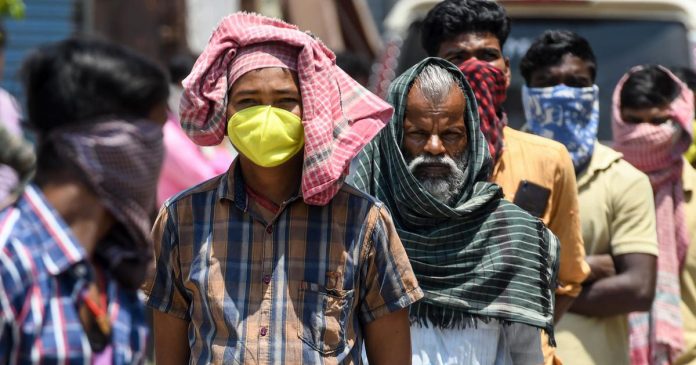The pandemic has indeed brought in an enduring economic crisis and this has resulted in a massive loss of jobs and livelihood opportunities and has unleashed severe financial strains on a wide majority of the Indian population.
But the section of the population that has most adversely been impacted by the coronavirus pandemic and the associated economic fallout has been the poor and disadvantaged or those who worked in the informal economy and had only their day to day earnings to bank upon.
With their livelihood opportunities already exhausted and meagre savings over within a couple of days of the lockdown itself, a major question that loomed large before them was regarding the impossibility of survival in the cities and therefore the need to go back to the comfort of native villages where they could perhaps manage with fewer resources. There can be no doubt about the fact that thousands of migrant workers in India chose to take long and arduous journeys back home, often on foot because survival in the cities in the absence of wages and economic packages became an impossible proposition. Clearly, hunger became a greater threat than coronavirus itself.
This section of the population began to be seen as carriers of the virus and were subjected to the loath and distrust of their upper and middle class employers. Even when there were numerous reports about the initial cases of the virus being reported in members of the high class, foreign returnees living in posh locales of urban India and not the poor and the marginalised. Even then, this section of the population began to be seen as threatening to the well-being of their upper class, urban employers just because they were poor and often lived in communities where there were greater hygiene issues.
No wonder, several Indian states such as Bihar initially refused to welcome back this section as it feared that they would bring back infection and disease to an already fragile healthcare apparatus. From the carts of fruit and vegetable vendors being toppled and damaged as middle/upper class colonies saw their arrival with suspicion and distaste, gated communities in our towns and cities choosing to ban and restrict the entry of domestic helpers, hawkers and delivery boys to brutal attacks on nurses from low income families in our neighbourhoods-the coronavirus pandemic has made our inherent discrimination against people from the poor and marginalised backgrounds clearer than ever before.
Our maids and house-helpers, sewage clearers and manual scavengers, construction workers and street vendors, factory workers and essential service providers like electricians, mechanics and plumbers who are responsible for running our lives in the cities and bringing essential services to our doors began to be suddenly seen as enemies, carriers of infection and as worthy of doubt and scepticism. The lockdown has opened up in most parts of the country and as many services finally resume, I can still sense the fractured relationships that we found around us during the lockdown.
The mistrust, lack of communication, doubt and strains between us and them have only grown and perhaps it will take a long time before things at least begin to get normalised or come at the same pace as they were before. What I intend to convey here is that the pandemic has highlighted the fractures, deepened the distances and given more power to the process of ‘othering’ in our society. What I see around myself today pains me tremulously because there is no way that India’s thousands and thousands of migrant workers can comfortably stay back in their villages and sustain themselves, they have to eventually come back to the cities to earn their livelihoods but instead of being grateful to them, we will continue to exploit, torture them and treat them as the perpetual ‘others.’ It is in this context that incidences from different parts of India can be used to highlight the fact that the poor and marginalised sections of the population are indeed being treated with neglect and apathy, disregard and neglect amid the coronavirus pandemic just because of the fact that they are disadvantaged, can’t fight as strongly for their rights as the educated urban class and finally because they are at the receiving end of the spectrum.
A local activist from Patna, Avkash Kumar shared during a recent conversation regarding the ill-treatment and marginalisation being meted out to the poor as far as access to services amid the pandemic is concerned said that even during entry into bank branches in the city where they hold accounts, migrant workers and other marginalised sections of the population are often roughly spoken to, demeaned and seen with disgust by bank employees and other account holders. He reported that during one such visit to a local bank, he saw how the security guard was asked to mildly hit and scare away three men(who looked impoverished but had brought along their passbooks) when another group of people who had come to the bank to withdraw money threatened to take action against the bank manager for allegedly allowing ‘infection-spreaders’ to enter the bank premises.
Similar instances were reported by Sharmila Upadhay, a social worker from Indore where she said that residential complexes had begun to see the inflow of domestic helpers but the attitude of employers seemed even more harsh and rude in many cases. From asking maids to change their clothes and take a bath before beginning housework, to relieving them of cooking responsibilities especially where the elderly live in the same apartment to rebuking and firing them if they happen to cough or fall ill, without giving them a notice or warning them in advance. Many of these women go back to homes that have abusive partners who often beat them up or indulge in alcoholism, a sudden job loss makes them more vulnerable to oppression and helplessness.
Shravanti Borah from Assam had a similar incident to narrate, as a women’s rights activist and someone who has been working for decades with women from the marginalised sections, she was taken aback by the way nurses and medical staff are treated by neighbours especially in neighbourhoods where others are better off than them. From being seen with disgust and societal boycott to being called names and seen with suspicion, she highlights the hardships that single working women in the cities such as Guwahati have to face as communities ostracise and demean them. She says that nurses and paramedics are often from low-income families and often live in shared rented spaces and have extensive hours of duty, neighbours who live in close proximity often grow weary of them and look at them as infection spreaders due to their work at the hospital. The three incidences above only highlight the extent to which the months of the pandemic have deepened the societal fractures, increased our tendencies of othering and made us more insensitive, selfish and inconsiderate. The pandemic should have been a time to unite and bridge us as a collective but paradoxically it has done the opposite. But while we look at them with doubt and suspicion and blame them for the pandemic in elitist tea-parties and video calls with friends and family, it is they who make our lives in the cities possible with their labour and toil and we are nothing without them.














